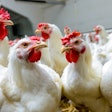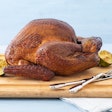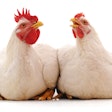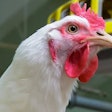Finnish Food Safety Authority Evira is campaigning in ports in Helsinki to fight African swine fever. The viral disease that kills pigs has spread alarmingly in our adjacent regions and is in the Baltic countries already widely found in wild boars. The spreading of the disease into Finland would cause extensive losses to pig farms and the entire meat industry as a result of the destruction of animals, rehabilitation of farms and ceasing of international trade.
African swine fever is a serious hemorrhagic fever disease in pigs and wild boars and there is no medication or treatment for it. Despite control measures, the disease continues to spread into new regions in the Baltic and in Eastern Europe. The threat of the disease spreading from these regions to Finland has also increased continuously. Due to infections, the whole of Estonia as well as most of Latvia and Lithuania is a containment area. The importation of wild boar meat and wild boar products into Finland is prohibited from this area to prevent the spreading of the disease. There are similar containment areas also in Poland, Czech Republic, Romania as well as Sardinia in Italy.
The authorities have launched a campaign visible as of December in the West Terminal and Katajanokka Ports in Helsinki, urging cruise ship passengers not to bring into Finland any wild board meat or foods made from wild board meat from the Baltic countries, Poland or any other areas affected by the disease. Imports of meat products are completely prohibited also from Russia, Belarus and Ukraine.
Highly contagious disease
The risk of the disease spreading via wild boar hunting trips into and importation of food from the affected areas is a real one, as the ASF virus is easily spread by people on their hunting equipment and footwear, as well as by food. The virus survives well in the environment and withstands freezing and various preparation methods of meat products well.
"The ASF virus is capable of spreading via e.g. a dried sausage and an air-dried or frozen meat product. In Estonia, it has also been suspected that the virus was originally transmitted from the south of the country to the north-east by campers in their carry-on food", says Section Head Sirpa Kiviruusu from Evira.
The disease has been spread by e.g. transports of pigs, feeding pigs with swill containing the virus, as well as wild boars. Infections that have occurred in new far-away regions have primarily been caused by feeding contaminated swill to pigs. The feeding of swill to pigs is prohibited in the EU.
Protection of production farms against the disease in key role
African swine fever can be spread to production farms also by infected wild boars. Good protection measures against the disease are the best way to prevent African swine fever from gaining access into a pig farm. As of June 2018, the open-air runs of pig farms must be provided with fencing that prevents snout contact with potentially infected wild boars.
Measures are taken in good cooperation with hunters to restrain the growth of the wild boar population. Evira and the association of Finnish pig farmers (Suomen Sikayrittäjät ry) pay hunters a fee for samples of wild boars hunted in Finland, when sent to Evira to be analyzed for African swine fever. The continuous increase in the number of samples is, for its part, an indication of the growing wild boar population.
Pork exports would stall immediately
The spreading of African swine fever is a major threat to pig farming. Outbreaks of the disease would cause significant losses to Finnish pork production as a result of the slaughter of animals, containment areas, and disturbances in logistics chains, as well as rehabilitation of farms. The consumption of domestic pork would probably also decrease, although the ASF virus is not contagious to humans.
"A confirmed case of the disease would immediately halt pork exports to several countries and cause long-term difficulties for the exportation of foodstuffs. Pork exports would most likely stop to several non-EU countries at once," reminds Senior Officer Riikka Lahdenperä from Evira.
In addition to protection measures introduced at pig farms, information and guidance play a key role in the fight against African swine fever.
"Communication of information to risk groups, such as foreign pig farm workers, importers of foodstuffs and Finnish hunters travelling to affected regions plays a key role in preventing the spreading of the disease", Ms. Kiviruusu emphasizes.


















